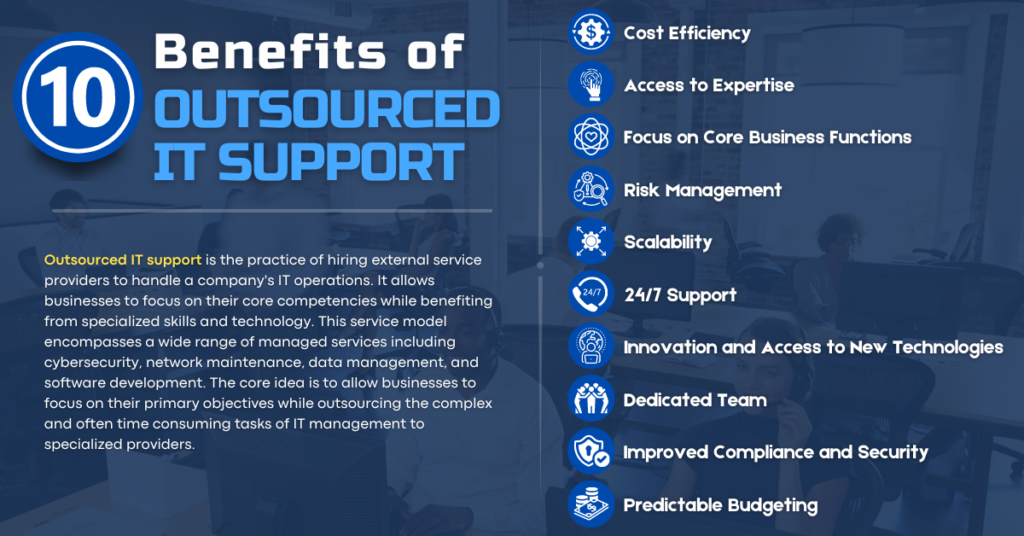Outsourced IT support has become an essential strategy for companies seeking to optimize technological investments and enhance operational efficiency. This method involves contracting external service providers to manage IT functions, transitioning from traditional in-house IT management to a more flexible, scalable model. It’s a response to the need for agility in today’s fast-paced business environment, offering access to the latest technologies and specialized expertise without the overheads of maintaining a full-time IT staff. This article delves into the 10 advantages of IT outsourcing, highlighting how it serves as a pivotal component in modern business operations.
Table of Contents
What is Outsourced IT Support?
Outsourced IT support is the practice of hiring external service providers to handle a company’s IT operations. It allows businesses to focus on their core competencies while benefiting from specialized skills and technology. This service model encompasses a wide range of managed services including cybersecurity, network maintenance, data management, and software development. The core idea is to allow businesses to focus on their primary objectives while outsourcing the complex and often time-consuming tasks of IT management to specialized providers.
This type of support is particularly relevant in today’s digital landscape, where IT is integral but also complex and rapidly evolving. Statista predicts the IT Outsourcing market will reach USD 541.10 billion in 2024, with an 8.48% CAGR from 2024 to 2029. By leveraging outsourced IT, companies access skilled professionals with broad, up-to-date expertise, ensuring the integration of the latest technologies and security measures. This approach transforms IT support from a fixed cost into a scalable, variable expense.
Through outsourced IT support, companies not only streamline their operations but also gain strategic partners who contribute to innovation and competitive advantage. This partnership extends beyond conventional service agreements, fostering collaboration and mutual growth, and aligning technological developments with business objectives in a way that internal capabilities might not support.
So, without further ado, let’s discuss how outsourcing IT support can be advantageous for businesses in reshaping their operational dynamics allowing efficiency enhancement and steady growth.
What are the Benefits of Outsourced IT Support?

Outsourced IT support stands as a cornerstone in today’s business landscape, offering numerous strategic advantages. By utilizing external IT expertise, companies tend to practice cost-effective strategies by substantially decreasing the labor costs associated with maintaining an internal IT department. This approach converts fixed IT expenses into flexible, variable costs, allowing businesses to pay for IT services only when necessary.
Outsourcing allows organizations to focus on core business areas, driving innovation and growth. It provides access to the latest technologies and expertise without heavy investments. With 24/7 support services, risk management, and compliance expertise, companies enjoy enhanced stability and security. The scalability and technological access provided by outsourced IT are critical for businesses to remain competitive in a tech-driven marketplace.
The top 10 benefits of outsourcing IT Support are as follows:
- Cost Efficiency
- Access to Expertise
- Focus on Core Business Functions
- Risk Management
- Scalability
- 24/7 Support
- Innovation and Access to New Technologies
- Improved Compliance and Security
- Dedicated Team
- Predictable Budgeting
1. Cost Efficiency
Outsourcing IT support can lead to significant cost savings by reducing the overhead associated with an in-house IT team by up to 70% and converting fixed IT costs into variable ones. This adjustment allows businesses to pay only for the services they need, enhancing financial flexibility and predictability in budgeting.
Companies get access to the latest technology and skilled expertise without the capital investment required for in-house resources. This enables businesses to scale their technological capacities alongside their growth without major upfront investments. The flexibility of outsourced IT services allows companies to adjust their operations to market changes or expansion opportunities efficiently. This scalability is essential for maintaining competitiveness in a dynamic business environment, ensuring that companies can adapt quickly and cost-effectively.
2. Access to Expertise
Leveraging external expertise through outsourced IT support offers significant value to businesses by providing access to a broad spectrum of professional knowledge and experience. This enables swift and effective resolution of IT support queries by experts, maintaining operational efficiency and preventing potential issues from escalating. Outsourcing also connects companies with a global pool of IT specialists with years of experience, enriching their technological capabilities without the need for extensive recruitment or training. Among small businesses who outsource IT support, 18% dedicatedly chose to access expert assistance.Rest assured, IT service providers are committed to staying at the forefront of technological advancements. They invest in continuous training to ensure their teams can deploy the latest technologies and best practices. This allows client businesses to implement cutting-edge solutions that enhance their competitiveness, leveraging innovations that may be beyond the reach of their internal resources.
3. Focus on Core Business Functions
By outsourcing IT support, businesses can better allocate internal resources to focus on core competencies that drive growth and innovation. Shifting the burden of IT management to external experts allows companies to concentrate their in-house talent on strategic goals and market differentiation. This prioritization of core business functions over maintaining IT systems provides a substantial competitive advantage, enabling businesses to respond more dynamically to both opportunities and challenges.
Outsourcing IT responsibilities also increase overall productivity among employees by freeing them from IT-related tasks. This allows staff members to dedicate more time and energy to their primary roles, enhancing efficiency and effectiveness across the organization. The strategic reallocation of tasks not only streamlines operations but also fosters a more focused and engaged workforce, saving time and money while promoting a culture of innovation and continuous improvement.
4. Risk Management
Outsourcing IT support equips businesses with robust defenses against operational risks, including cybersecurity breaches, data loss, and compliance violations. Companies benefit from advanced security measures and protocols that might be beyond the scope of in-house capabilities. These specialists bring their skills and a proactive approach to monitoring and responding to threats, ensuring that data and systems are protected against emerging security challenges.
The value of outsourced IT support in risk management extends across the business spectrum. It plays a crucial role in mitigating risks through continuous compliance with regulatory requirements, adherence to best practices, and the implementation of cutting-edge security technology. This comprehensive approach to risk management is vital for maintaining trust and operational integrity in today’s digital landscape, where threats are both unpredictable and potentially devastating.
5. Scalability
Scalability is a key advantage of outsourced IT support, allowing businesses to dynamically adjust their IT resources to match growth and demand fluctuations. This capability ensures that organizations can expand or reduce their IT services seamlessly, aligning their technology needs with business cycles without incurring unnecessary costs. By providing the ability to scale operations without the constraints of in-house resources, companies benefit from increased operational flexibility and the capacity to respond to market changes swiftly.
By utilizing outsourced IT services, businesses can not only manage costs more efficiently but also gain access to the latest technologies and infrastructure. This ensures that companies can leverage state-of-the-art resources without the hefty investment typically required for such advancements. The partnership with IT service providers helps maintain a technological edge, providing continuous updates and upgrades that keep the business at the forefront of its industry.
6. 24/7 Support
Access to 24/7 IT support is crucial for ensuring that business operations run smoothly and efficiently around the clock. This continuous support minimizes downtime and ensures that any IT issues can be addressed immediately, regardless of the time of day. In today’s fast-paced, always-on business environment, the ability to quickly resolve technical problems is essential to maintain uninterrupted service delivery and customer satisfaction.
Having a support team available across different time zones offers a significant advantage, particularly for businesses with a global presence. This setup not only provides timely assistance to all parts of the organization but also enhances the capability to manage and mitigate issues before they affect critical operations. This level of responsiveness is invaluable in preserving the operational integrity and reputation of a business in a competitive market landscape.
7. Innovation and Access to New Technologies
Partnering with outsourced IT providers positions businesses at the cutting edge of technological advancements, crucial for maintaining competitiveness in the rapidly evolving digital landscape. By accessing the latest technologies through these providers, companies ensure they are not left behind as new tools and software emerge. This continuous access to innovation is vital for any business aiming to thrive in today’s tech-driven market, as it directly supports enhanced efficiency, improved customer experiences, and the development of new products or services.
These providers don’t just supply technology; they also offer tailored solutions that align with specific business needs and objectives. Each solution is crafted to address unique challenges, whether optimizing operational processes, enhancing data security, or driving digital transformation. This bespoke approach ensures that technology adoption is not just about keeping up with trends but strategically enhancing business functions to foster growth and sustainability.
8. Improved Compliance and Security
Enhanced compliance and security protocols are key features of outsourced IT support, offering businesses robust cybersecurity measures. With 81% of global IT leaders prioritizing cybersecurity in outsourcing, this service ensures companies stay current with regulatory requirements, crucial in the fast-evolving digital threat landscape. By collaborating with specialists trained in the latest security practices and compliance regulations, businesses achieve superior data protection and effectively mitigate security risks.
Leveraging specialized knowledge from outsourced IT professionals allows businesses to navigate the complex landscape of regulatory requirements more effectively. This expertise is especially valuable for companies operating in heavily regulated industries such as healthcare, finance, and education. By ensuring compliance through expert support, businesses not only avoid costly legal penalties but also strengthen their reputation for reliability and security among clients and partners.
9. Dedicated Team
Having a dedicated team through outsourced IT support brings a breadth of IT skills and knowledge that many businesses find too costly or impractical to develop internally. This team includes specialists in cybersecurity, network management, and cloud services, whose expertise can be leveraged on demand. These experts ensure businesses can access high-level IT solutions without the ongoing expenses of training and retaining a diverse in-house team
The presence of a dedicated outsourced team also allows for continuity and a deeper understanding of a company’s specific IT environment. These teams become well-acquainted with their client’s systems and processes, which translates to quicker response times and more tailored IT solutions. This personalized service approach not only improves operational efficiency but also enhances the strategic use of technology in driving business goals.
10. Predictable Budgeting
Predictable budgeting is a significant advantage of outsourcing IT support, as it helps companies stabilize their financial planning. Various pricing models, such as fixed monthly fees or pay-per-service plans, provide clear and transparent cost structures. This transparency allows businesses to forecast IT expenditures with greater accuracy, ensuring that financial resources are allocated efficiently and effectively.
The adaptability of these pricing models supports a company’s evolving needs without undue financial strain. As business requirements change, the flexible nature of outsourced IT support aligns costs accordingly, preventing unexpected expenses and maintaining budget consistency, which is crucial for long-term financial health and strategic planning.



